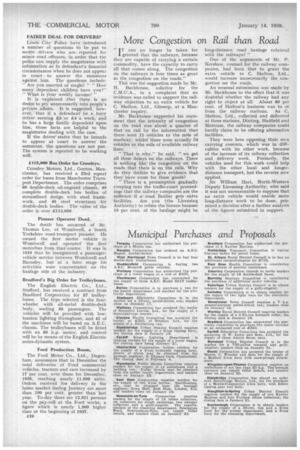More Congestion on Rail than Road
Page 8

If you've noticed an error in this article please click here to report it so we can fix it.
" TT can no longer be taken for I granted that the railways, because they are capable of carrying a certain commodity, have the capacity to carry all that comes along. The congestion on the railways is four times as great as the congestion on the roads."
This was the suggestion made by Mr, H. Backhouse, solicitor for the C.M.U.A., in a complaint that no —evidence was called to support the railway objection to an extra vehicle for C. Skelton, Ltd., Glossop, at a Manchester inquiry.
Mr. Backhouse supported his statement that the intensity of congestion on the road was about a quarter of that on rail by the information that there were 11 yehicles to the mile of roadway, whilst" there were actually 54 vehicles to the mile of available railway lines.
". That is why," he said, " we get all these delays on the railways. There is nothing like the congestion on the roads that there is on the rails. Why do they decline to give evidence that they have room for these goods?
" There is a presumption gradually creeping into the traffic-court proceed-. ings that the railway companies are the sufferers if a road haulier gets extra facilities. Are you (the Licensing Authority) to refuse the licence because 10 per cent, of the haulage might be long-distance road haulage colateral with the railways? "
One of the arguments of Mr. P. Kershaw, counsel for the railway companies, had beed that to grant the extra vehicle to C. Skelton, Ltd., would increase unnedessarily the congestion on" the roads.
An unusual submission was made by Mr. Backhouse to the effect that it was doubtful whether the railway had any right to object at all. About 80 per cent. of Skeltori's business was to or from the railway stations. As C. Skelton, Ltd., collected and delivered at three stations, Dinting, Hadfield anti Mottram, the railway companies could hardly claim to be offering alternative facilities. .
They were here opposing their own carrying concern, which Was" in difficulties with its other work, because of the increase of its railway collection and delivery work, Formerly, the vehicles used for this work could help with the other local and longerdistance transport, but the reverse now applied.
Sir William . Hart, North-Western Deputy Licensing Authority, who said it was not unreasonable to suppose that an extra vehicle would enable more long-distance work to be done, promised a decision after a further analysis of the figures submitted in support.


































